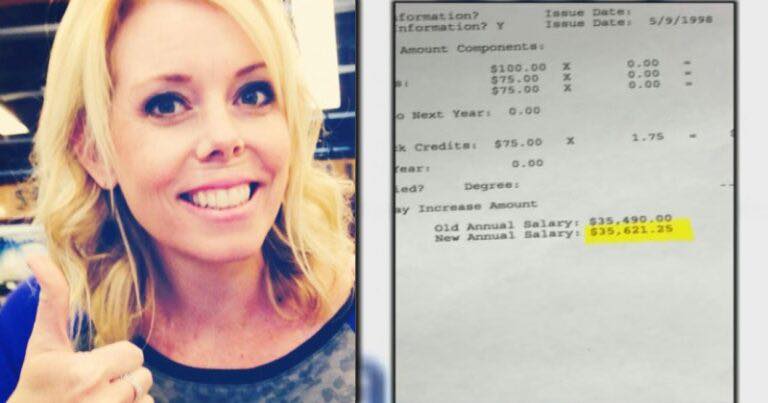Picture this: you’re enjoying your morning cup of coffee and scrolling through social media when you stumble upon a post that’s turning heads across the nation. Elisabeth Coate Milich, a brave teacher from Arizona, decided to do something most of us dodge like a stray dodgeball in gym class—talk about her salary. And not just talk, but post it online for the entire world to see.
In a country where whispering about money is more common than speaking up, Elisabeth decided to shatter that silence. She unveiled her pay stub hoping to highlight an issue that’s lurking in the shadows of our education system—the underwhelming pay teachers receive. To her, it was a way to spotlight a profession that requires years of education but, sadly, compensates less than you’d imagine.
Let’s cut to the chase: her Facebook post displayed a pay bump that was less than the cost of yearly premium streaming service subscriptions. Going from $35,490 to $35,621, a mere $131 raise! Now, let’s put that in perspective. Milich herself was taken aback, saying, “I actually laughed when I saw the old salary versus the new one. I need a college degree to make this?” Confronted with this reality, her disbelief embodies the frustration of many teachers who can’t balance passion with sustenance.
A Bleak Financial Picture
Elisabeth isn’t a newbie; she’s a seasoned second-grade teacher at Whispering Wind Academy in Phoenix. She shared her paycheck to pull back the curtain on the teaching profession. And what she revealed is daunting. Arizona is already notorious for having some of the lowest-paid educators in the U.S., with an average salary of $47,218, far below the national average of $58,353 per year.
But wait, there’s more. Teachers often have to dig into their own pockets for classroom supplies—things as basic as markers and tape. Imagine being responsible for molding young minds without being reimbursed for necessary materials. Plus, Milich is still burdened with student loans two decades after graduation. If it weren’t for her husband’s salary, she’d be in dire straits. Many of her colleagues, lacking an additional household income, juggle multiple jobs just to make ends meet. “I know teachers that teach kindergarten all day long and then they leave and they go waitress at Applebee’s,” she said.
Hard Choices, Harder Realities
Single teachers, in particular, face a grim outlook. Milich believes, “If you are a single person trying to make it on what we make, you couldn’t do it.” And the data supports her claim. A study by Arizona State University’s Morrison Institute for Public Policy in 2017 described the state of teacher recruitment and retention as a “crisis.” Nearly half—42%, to be precise—of the teachers hired in 2013 had quit by 2016. Moreover, Arizona’s elementary school teachers hold the dubious honor of being the lowest paid in the nation.
If nothing else, Elisabeth Milich’s bold choice to share her salary brought this pressing issue into sharper focus. It’s a wake-up call that’s reverberating across the country, urging stakeholders to reconsider the value and remuneration we assign to those who shape our future generations. And that, my friends, is a conversation we can’t afford to ignore any longer.






